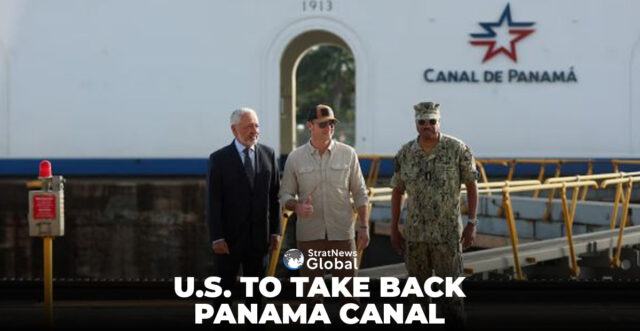U.S. Defence Secretary Pete Hegseth declared on Tuesday that the United States intends to “take back” the Panama Canal from growing Chinese influence, during his visit to the Central American country.
After talks with Panama’s government, Hegseth vowed to deepen security cooperation with Panamanian security forces and said China would not be allowed to “weaponize” the canal by using Chinese firms’ commercial relationships for espionage.
“Together, we will take back the Panama Canal from China’s influence,” Hegseth said, speaking at a pier renovated with U.S. assistance in Panama City.
“China did not build this canal. China does not operate this canal and China will not weaponize this canal. Together with Panama in the lead, we will keep the canal secure and available for all nations.”
More than 40% of U.S. container traffic, valued at roughly $270 billion a year, goes through the Panama Canal, accounting for more than two-thirds of vessels passing each day through the world’s second-busiest interoceanic waterway.
Hegseth, the first U.S. defence secretary in decades to visit Panama, flew over the canal in a Black Hawk helicopter after meeting U.S. troops and Panamanian security forces. He also toured the Miraflores lock, waving to sailors passing through on a container ship.
Hegseth’s Assurances
His language appeared fine-tuned, talking tough but offering some assurances to Panamanians still unsettled by Trump’s threats to reclaim the canal.
While Hegseth spoke about removing Chinese influence, Trump has spoken in broader terms and not ruled out using military force.
Hegseth’s trip follows reports that the Trump administration has requested options from the U.S. military to ensure access to the canal, which the United States built more than a century ago and handed over to Panama in 1999.
Trump has complained that was a bad deal for the United States.
Given Trump’s tough rhetoric, the stakes were high for Hegseth’s visit.
“On the whole, this hasn’t been a winning issue for the United States in terms of public diplomacy in Panama,” said Ryan Berg, director of the Americas Program at the Center for Strategic and International Studies.
Still, current and former U.S. officials and experts say the United States has found a willing partner in tackling Chinese influence in Panama’s President Jose Raul Mulino, whom Hegseth met earlier on Tuesday.
Panama’s Exit
In February, Mulino announced Panama’s formal move to exit China’s Belt and Road Initiative and he has aided Trump’s crackdown on migrants.
He has accepted deportation flights of non-Panamanians and worked to stem migration from South America by those crossing through his country’s dangerous Darien jungle.
Hegseth praised Mulino, saying his government understood the threat from China, and his remarks about Panama being in the lead on addressing the canal’s security concerns appeared to be a nod to Panamanian sensitivities.
During his visits to bases, which once had names including Fort Sherman and Rodman Naval Station before the U.S. exit, Hegseth spoke about the canal as “key terrain” and held out hope for more frequent engagements by U.S. troops, including by revitalizing a jungle survival training center.
“In reality or in perception, the communist Chinese have had designs on more control of this canal, and to that we say: Not on our watch,” Hegseth told U.S. troops and Panamanian security forces. “We will grow our partnership even more.”
Hegseth, a U.S. military veteran and former Fox News host, has enthusiastically backed Trump’s southern-focused security agenda, by means such as dispatching U.S. troops to the U.S. border with Mexico, offering space at a base at Guantanamo Bay, Cuba to detain migrants, and military aircraft for deportation flights.
U.S. Security Concerns
Trump has falsely claimed that China is operating the canal, something even Hegseth said was not true on Tuesday, and that Chinese soldiers are present.
But experts acknowledge U.S. security concerns, particularly regarding espionage, with an expansive Chinese commercial presence in Panama that also includes plans by Chinese firms to build a bridge over the canal.
“China has never been involved in the management and operation of the Panama Canal, nor has it ever interfered in the affairs of the canal,” said a statement by the Chinese Embassy in Panama.
“The only time in history the canal has been cut off was because of a U.S. invasion. Who is truly safeguarding the canal’s neutrality and prosperity? Who keeps clamouring to ‘take back’ the canal? Who is the real threat to it?”
Last month, Trump celebrated a deal led by U.S. firm BlackRock to buy most of the $22.8-billion ports business of Hong Kong conglomerate CK Hutchison, including its ports on either end of the Panama Canal.
Trump said the purchase was an example of how the United States was “reclaiming” the canal.
But China has criticized it, with the market regulator saying it will carry out an antitrust review of the deal.
Current and former U.S. officials say the Panama Canal would be critical for the passage of U.S. warships during any future conflict in Asia, since Navy vessels would transit from the Atlantic to the Pacific to support the war effort.
Even without blocking the canal, China could keep tabs on vessels passing through it.
Still, John Feeley, who was U.S. ambassador to Panama from 2015 to 2018, disputed the Trump administration’s assertion that China’s presence in Panama was a violation of the U.S.-Panama treaty.
“What’s not legitimate about the way Trump has gone about this is the bullying tactic that he’s used, which is to claim that there has been a violation of the neutrality treaty. There hasn’t been,” Feeley said.
Mulino has defended Panama’s administration of the canal, saying it has been handled responsibly for world trade, including that of the United States, and that it “is, and will continue to be, Panamanian.”
(With inputs from Reuters)





